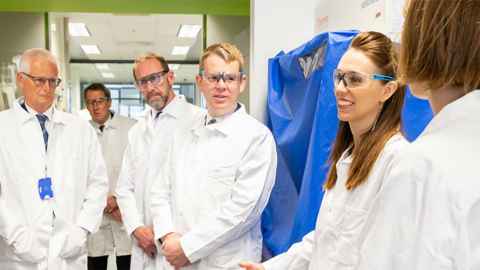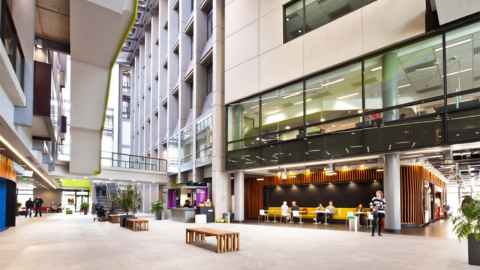Covid pandemic a reminder of importance of philanthropy
21 October 2021
With a crisis, there often comes an opportunity to see more clearly how a system works. The outbreak of Covid-19 has given a crucial example of this.

All students, staff and researchers from the Faculty of Medical and Health Sciences are aware of the donors’ generous gifts as a vital resource for sustaining and advancing the faculty’s world-class training and research.
Dean of the faculty, Professor John Fraser, is very clear on this: “The power of what we achieve cannot be done without our donors,” he says.
However, the sudden threat that arose from the worldwide spread of Covid-19 reminded us very strongly of the other essential component of the circle of philanthropy: that the faculty is able to step up when the community needs it to supply the specialised medical expertise that is called for.
“We’ve been involved at all levels with Covid-19,” says Professor Fraser, “because we have a very high level of expertise – in infectious diseases, epidemiology, microbiology, immunology, all of which are vital for a crisis such as this.
“We’ve been able to give advice to officials around the best strategies to deal with the virus and its variants along with the best vaccines to use and advice about the safety and efficacy of vaccines; we’ve partnered with the Auckland hospitals to develop testing processes for Covid-19; and we’ve provided serological analyses to look at Covid-19 antibodies in people.
“Our work has truly been of world class and huge benefit to the national cause of pandemic control. Though carried out to support the New Zealand efforts it has now been published and is internationally available.
“In addition, our staff have volunteered many hours to help with essential services such as testing samples during the most critical periods of need.
“I’m very proud of the part we’ve played in getting the country to where we are now.”
He adds that researchers in all the fields he mentioned, including his own (infectious diseases), have had reason to be grateful for the generous support of philanthropists over many years.
Our staff have volunteered many hours to help with essential
services such as testing samples during the most critical periods of need.
When the University’s Medical School was first established in 1968, its inaugural Dean, Professor Cecil Lewis, had “a very distinctive vision for the direction of the Medical School, which involved its relationship with the wider community,” says Professor Linda Bryder from the University’s Department of History.
Professor Lewis had the beliefs, very fresh and advanced for their time, that community health was integral to a medical school, that community connections needed to be strong, and that diversity should be a strong value both in the training the school provided and in the type of students it trained. This last he affirmed when, in 1971, he introduced a preferential place scheme for Māori and Pacific students.
Through the years these founding values and the relationships with the community have remained at the base of an astoundingly rapid advance in medical sciences at the University of Auckland.

After just over five decades, that same Medical School, set up with the goal of providing a world-class medical education, has now become the Faculty of Medical and Health Sciences, a vibrant centre of research and education in all the health disciplines, light, bright, spacious and well-equipped, with purpose-built clinics, laboratories, study and communal spaces. Its students number more than 4,000 (up from 60 in that first year), studying in six Schools across the faculty: the Schools of Medicine, Population Health, Nursing, Pharmacy, Medical Sciences, and Optometry and Vision Science.
Largely owing to efforts by the Māori and Pacific Admission Scheme (MAPAS) almost 20 percent of the faculty’s students are now of Māori or Pacific ethnicities.
The School of Medicine Foundation, which receives and administers the funds from the faculty’s philanthropic partners, has been renamed the Medical and Health Sciences Foundation, in recognition of the rich diversity of scholarship and research its donors now support.
And the faculty’s research, in many fields, has transformed medical practice and saved countless lives – not only in our communities but in others worldwide.
Internationally respected research has abounded in the faculty, says Professor Fraser, who mentions just a few examples: in brain research, the world-changing discovery that brain cells have the power to regenerate; in child health, the development of new applications to assess the mental health status of adolescents; in cancer research, the advances in personalised medicine, which allow analysis of a patient’s genomic information for the provision of tailor-made treatments. All of these, and many more, show the power of philanthropic partnerships.
However, community support is also crucial in other ways, as shown in the work of Distinguished Professor Ian Reid, who heads the faculty’s Department of Medicine. Professor Reid conducted, with his team, the first-ever randomised controlled trials of bisphosphonates for osteoporosis, which later became the treatment of choice for that condition worldwide. He went on to show in more recent research that the same class of substances sustain bone health and help prevent bone fractures also in those with osteopenia, which is milder than osteoporosis but threatens bone health in a larger proportion of the population.
“For any of the many clinical trials now being held across the faculty, the public contribution is essential,” he says. “We depend on the commitment of the tens of thousands of New Zealanders who have been willing to take part.”
Another successful reciprocal cycle is seen in the University’s thriving public clinics in disciplines such as Optometry and Audiology, which offer an essential service to the community while giving its students the immeasurable benefits of receiving world-class training in a real-world setting.
The power of these partnerships is in their shared purpose. The ultimate aim is to advance the community’s health. And the final and wonderful message is: we are in this together.
Media contact
Helen Borne | Communications Manager
Alumni Relations and Development
Email: h.borne@auckland.ac.nz